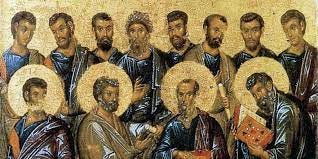To read the introduction to this study you can click HERE. At the bottom of the introduction you will find links to each part of the study guide as it becomes available. If you would like to see the growing list of book studies available for free on this site you can go HERE. Enjoy!
Virtues/Vices/Great Ideas: (Find them in the Text)
Justice, Thankfulness
Grammar Questions: (The Information of the Text)
List five practices that belong to “the way of death”.
What command was given at the end of chapter 5?
Whose name are Christians to be baptized in?
According to The Didache what is the preferred baptismal situation and what is permissible concerning baptism in less than optimal situations?
What are both the baptized and the baptizers exhorted to do prior to baptism?
How many times a day are believers commended to pray the Lord’s prayer?
According to The Didache, who should be forbidden from taking part in the “Eucharist”?
How many communion (Eucharist) related prayers does The Didache teach ought to be prayed each time it is taken?
According to the final communion prayer, why did God give “food and drink” to mankind?
What should “prophets” be permitted to do “as much as they desire”?
Logic Questions: (Interpreting, Comparing/Contrasting, Reasoning)
What does the text mean when it refers to “watching not for that which is good, but for that which is evil”?
What is meant by saying, “if you are able to bear the entire yoke of the Lord, you will be perfect; but if you are not able to do this, do what you are able”?
What is meant by referring to idols as “dead gods”?
The text says the hypocrites fast on “the second and the fifth day of the week.” Why might it matter what days of the week a person chooses to fast?
When The Didache refers to “the broken bread” that “was scattered over the hills, and was gathered and became one” what is it referring to?
Who are “the prophets” being referred to in The Didache?
Rhetoric Questions: (The Analysis of Ideas in the Text)
Consider what is said about “the poor” and “the rich” in chapter 5. Are the poor synonymous with the righteous and the rich synonymous with the unrighteous? If so, why is that? If not, why does the text speak of people in these categories in the way it does?
Jesus’ teaching assumes that believers will practice fasting as part of their spiritual life and discipline (c.f. Matthew 9:14-17) but he does not prescribe the frequency or specific occasions upon which believers must fast. How should Christians incorporate fasting into their life and discipline as they follow Jesus? Do you think the elders of the church can tell the members of their church when they should fast (such as in times of crisis or before being baptized, etc.)? Why or why not?
Should believers memorize and recite prayers? What are the potential benefits and dangers to memorizing prayers? What are the potential benefits and dangers of spontaneous prayers? Do you think one form of prayer is to be preferred over the other? Why or why not?
Theological Analysis: (Sola Scriptura)
Read Matthew 28:18-20. How does this passage relate to the teachings of The Didache? Think not only of its teaching on baptism but also about the purpose of the whole text in general?
Read 1 Corinthians 10:14-22. What does this passage teach about eating and drinking food offered to idols versus eating and drinking the Lord’s supper? What does the text say it is impossible to do?
Read Romans 6:1-4 and 1 Corinthians 12:12-31. How do these two passages reinforce the teaching of The Didache that only the baptized should partake in the Eucharist?



